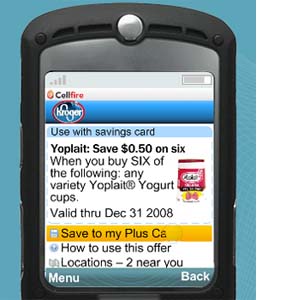 |
| From NMT Images |
Location-based marketing or geo-location allows a business to “capture a customer” when he or she is near a place of business creating, what the Hospitality Sales and Marketing Association International (HSMAI) calls a “here and now experience for consumers”...meaning, delivering real-time calls to action to buy, explore or just engage customers.
It’s what they’re now calling “brand on demand.”
A lot of the talk about location based services has to do with “badges’ and “mayorships” (Foursquare) or Gowalla’s “spots” or MyTown’s Monopoly-like “buying or collecting rent” system.
The real deal, according to HSMAI, is not the “fun and games” application of these location based services.
The real deal is mobile “couponing” via “geo fencing,” the practice of tracking people based on proximity to a location and sending out tailored messages. Or as is more often the case, a coupon or Groupon.
Far from objecting to receiving mobile coupons, according to jiWire’s Mobile Audience Insight Report more than 50% of respondents said they wanted to receive location-specific advertising. They said mobile coupons were “more appealing than the check-ins” associated with the typical social networking use of lbs’s.
Whatever happened to “invasion of privacy” cries?
Seems like we’re happy to give up all kinds of information, just as long as we decide to give it up in exchange for something we value, and that’s more than status updates these days.
Even more astonishing, the Mobile Marketing Association reported that 63% of iPhone users actually want their phones to share their location...in exchange for stuff like mobile coupons.
Apparently the appeal and convenience of digital, mobile-based coupons is attracting a younger consumer who is expected to grow to 300 million coupon users contributing, according to Juniper Research, a whopping 6 billion dollars globally (by 2014) in redemptive value.
Delivering a local coupon to a user based on where he lives (digitally zoned area) is great for the consumer, but it allows the merchant to get vital feed back relative to
the popularity of the offer and how quickly it was redeemed. And it allows the recipient to invite friends and colleagues along to share in the mobile coupon.
But, LBS observer and blogger, Eric Leist, says consumers have been giving up their purchase data to brands like CVS and grocery chains in exchange for coupons for years. Now that they can provide location data, will consumers give up ever more?
Leist says the evidence seems to point that way: “We're just waiting for the right platform to develop a technology that has legs to reach the mainstream.”
As far as hotels are concerned, HSMAI notes that LBS allow a property to locate guests prior to arrival, start the check-in process and keep in touch with the guest during his or her stay. By getting familiar with the guest’s needs and activities, and presenting related options like spa treatments or meal specials, the hotel builds a loyal fan base.
HSMAI warns, however, that real-time location data is very personal, and anyone embarking on this kind of marketing strategy must ask users to opt in, and give permission.
Comments